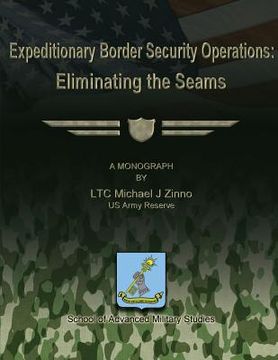Reseña del libro "Expeditionary Border Security Operations: Eliminating the Seams (en Inglés)"
Within the context of the current US government endeavor to unify its actions and build partner-nation military capabilities in the Global War on Terror (GWOT), this monograph seeks to determine the potential value of utilizing expeditionary interagency border security teams (BSTs) to conduct border security operations and training during theater security cooperation activities. Specifically, this monograph answers whether border security operations will assist nations in countering destabilizing elements within their nations and, subsequently, impacting the operational scope and capability of global terrorist networks that threaten US national security. This paper uses case studies in the Tri Border area of South America and the Trans Sahel region in Africa to examine the threat from a convergence of terrorist and criminal organizations toward complementary efforts and their use of porous border regions to conduct logistical activities. To counter this threat the paper analyzes a case study of Post WW II Germany and develops a framework for border security operations consisting of eight principles: consistent national agreements established upfront between allied and partner nations concerning border security policies; integrated border security policies at the US national level; the ability to communicate with the local populace culturally and linguistically and provide outlets for information requirements from the local population; early intervention to prevent a collapse in security that would require major international military intervention; a border security force which has a static and mobile capability; the use of indigenous population in border security forces; an integrated economic development plan; and a graduated suppression of black market activities. Adding to this framework the paper analyzed the development of the Israeli Border Police and found a set of principles to aide in future border security operations and training missions. In summary the principles of an effective border security force are; permanent status as government organization under the command and control of the National Police, with a decentralized flexible tactical command structure, that is culturally diverse, integrated into society and specially trained and supervised by a professional cadre of mature NCOs and Officers and Utilizing the framework developed from the case studies, the paper investigates existing GWOT border security initiatives in Africa and South America and concludes that these programs have limited effectiveness. The shortfalls in these initiatives lead to five recommendations to increase the impact of these programs on US national security. First, the US should integrate its various national strategies at the NSC level to develop a comprehensive strategy to address the asymmetric threats to US borders. Second, a US joint doctrine publication should be developed to codify the principles of border security operations, force development and training highlighted in the case studies. Third, the US Army and US Marine Corps should develop the capability to train and develop foreign border security forces, facilitate the construction of necessary border security infrastructure, and make these capabilities available to GCCs for use during Theater Security Cooperation Activities. Fourth, develop in all applicable US government agencies a capability to provide a sufficient amount of deployable civilian employees with expertise in border security operations. Finally, as nations develop innovative solutions to counter the adaptive transnational threats, those departments and agencies involved with US border security teams must develop a process for sharing, learning and implementing new changes to stay ahead of the threats' ability to communicate its adaptations.

